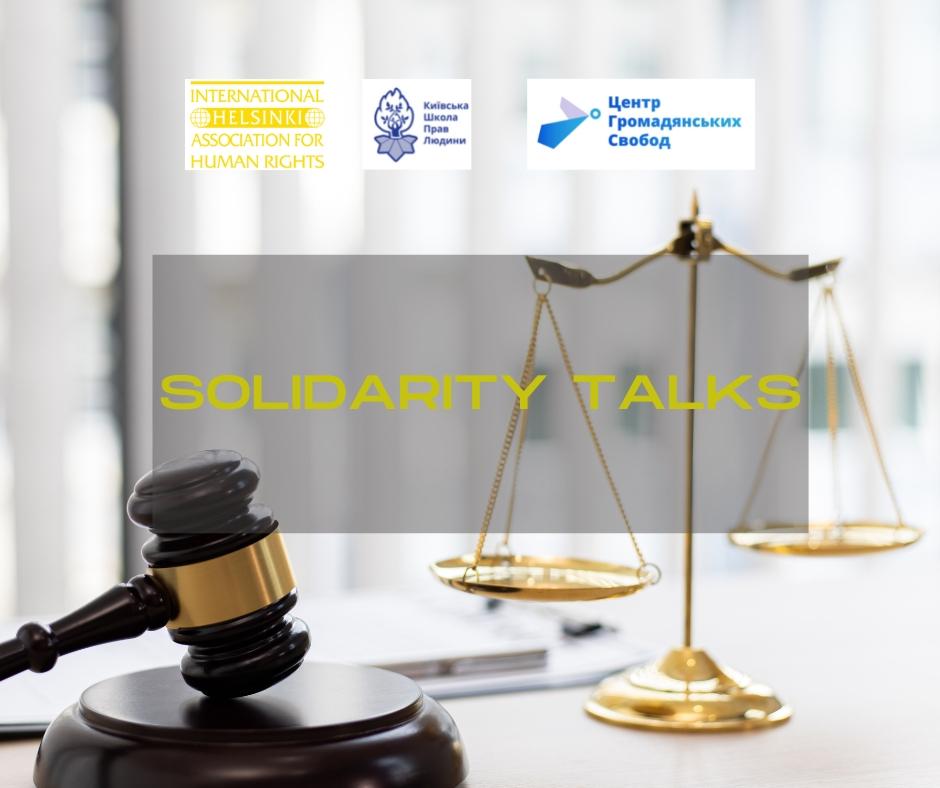Human rights activists will form an international working group for proposals to reform IHL

Human rights defenders from several countries agreed to create an international working group to develop proposals for reforming international humanitarian law. This decision was made following another discussion in Solidarity Talks on the topic “Russian aggression against Ukraine: what changes are needed in international humanitarian law?” held by the Center for Civil Liberties (CCL) and the International Helsinki Association.
Thus, during the discussion, human rights defenders of Ukraine, Russia, and other countries discussed the necessity and direction of reform of international humanitarian law (IHL).
Most of the event participants emphasized that the most significant war in Europe after the Second World War demonstrated the weakness of the world security system and international humanitarian law.
“The Prosecutor’s Office of Ukraine talks about more than 44,000 war crimes committed by the Russian military in Ukraine. Among the crimes committed by the Russian military, there are excesses of the perpetrators. Still, most of them were committed within the framework of the state policy of the Russian Federation,” emphasized Mykhailo Savva, an expert at the Center for Civil Liberties.
It is worth noting that the people who created the essential documents of IHL did their best in the political realities of their time, that is, seventy to fifty years ago. However, the Geneva Conventions and the additional protocol are already outdated.
Yulia Polekhina, a lawyer at the Ukrainian human rights organization “Sich,” emphasized: “the norms of monitoring the implementation of international humanitarian law do not work, states lack incentives to fulfill their obligations, and the international community has no mechanisms to influence violators.”
Nicolas Lignol, a partner at the Paris law firm “Cabinet Lignol,” in turn, offered to work with governments so that they introduce into the criminal codes of their countries responsibility for violations of international humanitarian law by their citizens.
Mykhailo Savva, an expert at the Center for Civil Liberties, singled out three groups of problems.
The first group is the inconsistency of IHL norms with modern technologies. Namely, the lagging of these norms from the possibilities provided by today’s communication technologies. For example, when the Geneva Conventions and the Protocol were adopted, there was no Internet or e-mail. Therefore, the Russian authorities do not allow Ukrainian prisoners of war and civilian detainees to use e-mail to correspond with their relatives.
The second group is the problems of non-specific formulations. IHL prohibits the deliberate destruction of civilian infrastructure. Russia is doing it before our eyes. The most obvious example is the shelling of energy infrastructure. Terrorists will not achieve their goals. There are studies that show that the strategy of destroying the energy infrastructure does not work in modern wars. But this strategy increases people’s suffering. At the same time, the Russian Federation pretends that the energy facilities are legitimate military targets. Clear boundaries must be drawn between legitimate military targets and civilian infrastructure.
The third group is the weakness of control over compliance with IHL norms. These issues are essential. Ukraine and Russia are participants in the Geneva Conventions. Both countries declared at the beginning of this war that they intended to comply with the norms of IHL. At the same time, UN observers note a vast number of violations of IHL and conclude that these are systemic on the part of the Russian Federation. International humanitarian law does not perform any of the most critical functions – prevention. In other words, in its current form, IHL is unable to prevent war crimes, human rights violations, and human suffering.
It will be recalled that during the last discussion in the Solidarity Talks format, human rights defenders emphasized that the Russian aggression should become the lesson that will lead to reforming the entire system of international humanitarian law and will allow reducing the scale of human rights violations during the war.

